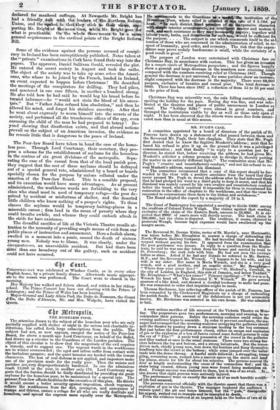lje 311rtrapi1is.
THE HOMELESS POOR.
The attention drawn to the subject of the homeless poor who are only partially supplied with shelter at night in the unions and charitable in- stitutions, has called forth large subscriptions from the public. The subject had not, as now appears, escaped the notice of the Poor-law Board, for above a month ago Lord Courtenay, on behalf of the Bard, had drawn up a circular to the Guardians of the London parishes. The object of this circular is to show that the magnitude of the evil requires a remedy, and to suggest one. The vagrant wards in the workhouses are in winter overcrowded ; the aged and infirm suffer from contact with the turbulent paupers ; and the quiet inmates are herded with the lowest characters. The test of real distress is not applied, and impostors make use of the provision made for the really poor. Then the unions and parishes are.very disproportionately- burdened. In one the admissions reach 13,000 in the year, in another only 178. Lord Courtenay sug- gests that the burden should be fairly distributed by providing six great asylums for the homeless poor, to be maintained by a special rate. The present Poor-law affords facilities for the execution of this plan. He thinks it would ensure a better security against imposition, check vagrancy, relieve the workhouses from the dirt, contagion, and annoyance of tramps and thieves, ensure a refuge for all who are really destitute and homeless, and spread the expense more equally over the Metropolis.
He moommends to the Guardians as a model, The institution of thq' Honseleas Poor, where relief is afforded at the rate of 5 1-10d. par head. " in each district hired premises of an inexpensive charactei with aimple interior arrangements, an intelligent master and matron each, and such assistance as they may necessarily require; together wi ' labour yards, baths, and dormitories for each sex, would be sufficient fo; ,
the purpose The subject is one which commends itself to the at-.. tension of those who are concerned in the administration of relief, in re-, spect of humanity, good order, and economy. The risk that the expen- ) diture may prove unduly burdensome is small, while the certainty of a 1 good result is great."
The paupers of London were entertained with Christmas fare on Christmas Day, in accordance with custom. This has given an occasion for a compte rendu of Metropolitan pauperism ; and the figures happily show a general and large decrease in the numbers now receiving relief compared with the numbers receiving relief at Christmas 1857. Though general the decrease is not universal, for some parishes show an increase, slight compared with the decrease in the majority. There were 60,000 paupers exclusive of lunatics and casual poor. The total decrease is 6000. There has been since 1867 a reduction of from 15 to 26 per cent in the price of food. I
Christmas Day was miserably wet, the rain falling continuously, and spoiling the holiday for the poor. Boxing day was fine, and was cele- brated at the theatres and places of public amusement in London ae usual. The "holiday folks" were abroad in great numbers, and thronged the institutions visible by day as well as those only open at night. It has been observed that the streets were more free from intoxi- cated men than is usual at this season.






































 Previous page
Previous page